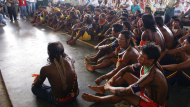Tribes Dispute Greenwashing by Dam Builders
Zachary Hurwitz
zachary@internationalrivers.org
+1 510-848-1155
Zachary Hurwitz
zachary@internationalrivers.org
+1 510-848-1155
Indigenous people from Brazil's vast but shrinking Amazon region yesterday interrupted the Congress of the International Hydropower Association, claiming that the Belo Monte Dam was approved illegally by the Brazilian government, vowing to fight as long as it takes to stop the dam. At the same event, environmental activists dismissed a new voluntary environmental tool as an effort by the dam industry to greenwash its practices.
Sheyla Juruna of the Juruna tribe, which
would be directly impacted by the Belo Monte Dam as it reduces access to
water on the Xingu River, surprised the director of Brazil's Eletrobras
while he was giving a presentation in which he claimed that the
Brazilian government received consent to build the dam from the region's
most important indigenous leaders. Ms. Juruna, who was joined by Mr.
Patxon Metuktire, grandson of legendary chief Raoni of the Kayapó tribe,
gave detailed accounts of the reunions with indigenous leaders, in
which government representatives set up photo opportunities and
expressed the monetary compensation that the tribes would receive, while
never receiving their final consent.
The two indigenous
representatives also described to an audience of concerned industry
figures and politicians from across the world how the Brazilian
government recently approved a construction license for the dam, despite
the Norte Energia consortium never having fulfilled the 40 social and
environmental prerequisites mandated by Brazilian legislation to prepare
the region to face Belo Monte's impacts.
Ms.
Juruna, whose tribe would suffer directly from reduced access to water
as 80% of the Xingu river is diverted into two reservoirs, stated that
"Norte Energia's avoidance of its requisite social and environmental
duties are representative of a larger problem in the hydropower
industry. Dam builders don't comply with their legal responsibilities,
in order to avoid paying higher costs. It's a shame that the industry
pretends it has obtained consent from affected indigenous people, when
there is glaring evidence that it has not." The statement echoed recent
opinions by the Inter-American Commission on Human Rights and by
Brazilian academic associations, which have requested a moratorium on
the dam until the matter of indigenous consent is resolved. The
Brazilian government reacted harshly against the decision of the IACHR,
threatening to remove its representative from the multi-lateral body.
This
week's protests coincided with the dam industry's official launch of
the Hydropower Sustainability Assessment Protocol, a voluntary score
card for the dam industry to measure how well it complies with social
and environmental sustainability guidelines. However, environmental
organization International Rivers claimed that the new guidelines are
weak, in that they do not require developers to comply with national
legislation nor with international policy standards. The new score card
promotes indigenous peoples' right to Free, Prior, and Informed
Consent, but does not require hydropower developers to obtain it before
beginning construction.
Zachary
Hurwitz, International Rivers' Policy Coordinator, stated that "there
is a conflict of interest at the heart of the Hydropower Sustainability
Assessment Protocol. While it's necessary for industry to learn how to
do sustainability in the right way, the Protocol substantially increases
the risk that hydropower companies will be allowed to greenwash a
project while they continue to cut corners behind closed doors. The new
guidelines essentially put the fox in charge of the hen house."
The
fracas at the conference also reopened older wounds felt by people who
were displaced by the Itaipú Dam, currently Brazil's largest, during the
1980s. Representatives of the Guaraní tribe, who were displaced by the
dam and currently live in run-down encampments on the shores of its
reservoir, joined a group of Brazil's Movement of Dam-Affected People
outside the Congress, in protest of what they claimed were structural
human rights violations and a lack of transparency in the Brazilian dam
industry.
According to Patxon Metuktire, "Dam-affected people
and civil society expect the dam industry to follow national law and
international standards in each case, so that projects like Belo Monte
and Itaipú, which have great social impacts, don't go forward. We won't
accept the dam industry's greenwashing."
-----------------------------------------------------------------------------------------------------------
For more information about the IHA's Hydropower Sustainability Assessment Protocol: http://www.internationalrivers.org/en/node/6563
For more information about the Belo Monte Dam:
http://www.internationalrivers.org/en/node/5236
For more information about the Movimento Xingu Vivo Para Sempre:
http://www.xinguvivo.org.br (Portuguese)
International
Rivers is an environmental and human rights organization with staff in
four continents. For over two decades, International Rivers has been at
the heart of the global struggle to protect rivers and the rights of
communities that depend on them.

